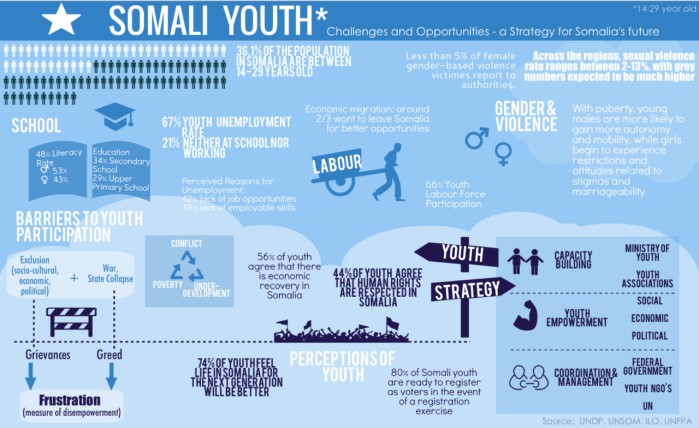Somalia’s challenges – and opportunities
Somalia, where I grew up and spent most of my life, is a country plagued by civil war, armed conflict, terrorism, and political, economic and social crises. Amidst the resultant breakdown of law and order, displacement, poverty, migration, and deep instability, the young generation – like other vulnerable groups in society – was used as a tool on the battle field. But it was entirely excluded from political processes and decision-making.
Studies show that over 70% of the Somali people are less than 30 years old. This majority has the capacity to either destroy the country further or contribute to its rebuilding.
Somali history recognizes a group of 13 young men as the founding fathers of the nation. They brought about independence through sheer determination and a commitment to defeat colonial powers. Yet today, young people are excluded from the system, perhaps to the detriment of our nation.
It’s essential that youth perspectives be included in peace-building processes and decision-making on peace and conflict. The inclusion and participation of young people enhances their capabilities and affords them the opportunity to develop their lives as well as their societies. Including youth in peace-building processes, as stakeholders and decision-makers, allows them to gain ownership of the policies that affect them as much as the rest of us. It is also necessary to bring about a paradigmatic shift in the concept of the role of youth in conflict which transforms them from being victims or agents of violence to being active agents of peace-building and positive social change.
The main challenges that Somali Youth face today:
Although they make up the majority of society they are completely excluded from processes of decision-making, even though these very decisions determine their future.The absence of basic economic infrastructure and a lack of social services fuel a high rate of unemployment among the young generation; 67% of Somali youth are estimated to be unemployed.A lack of any clear and promising policies that will help to overcome the issues which trigger emigration, violence and youth exploitation.
It is also important to emphasize youth involvement at the community level. There is much to be gained from including youth in the peace-building and community engagement processes, including strengthening their capability of contributing and leading healthier, progress-oriented and more enthusiastic communities.
The inevitable solutions that need to be implemented:
Guarantee formal and informal education for young people, channeling their power and energy into learning and development.Acknowledge and include young people as stakeholders in the process of peace and security building, bearing in mind that they are both affected by conflict and the key to a progressive nation.Eliminate the catalysts of conflict, including those related to economic challenges (youth unemployment) and the political exclusion of the youth.
Author: Sagal Isak, Director, Constitutional Development Department, Ministry of Constitutional Affairs and Reconciliation, Somalia, and a Global Shaper from Mogadishu hub.






comments (0)